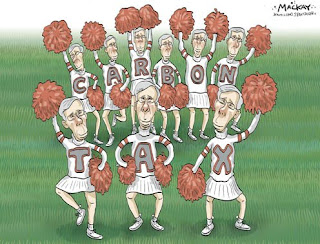
Let me pick up on a post from earlier this week, which I admittedly didn't provide much commentary on: "Price Matters." The reason why price matters, and why a carbon tax is superior to a cap-and-trade system, is that it acknowledges that some carbon emission is socially optimal.
Socially optimal? Whoa! Didn't the EPA just label carbon dioxide a pollutant? Yes, but remember that as with all pollutants, the socially optimal amount is likely not zero.
Think about it this way: at least in the medium term (which even the rosiest forecasts assume means something like a generation or two), and perhaps forever, some of our energy is going to be in the form that leads to carbon emissions. So one way to reduce carbon emissions is for industry to come to a grinding halt.
That can't be a socially optimal solution. Rather, obviously, there's some amount of economic activity that is justifiable, even if it leads to carbon emissions, because the positive consequences of that economic activity are worth more to us as a society, even factoring in the environmental element, than doing nothing.
The problem today is not that we have pollution at all, but rather than we have more pollution than is socially optimal, since the cost of polluting is artificially low. The solution, therefore, is not to eliminate pollution altogether, but to drive it down to a level at which point the economic benefit to all of us is at its greatest, considering that the trade-off of more economic activity is more pollution.
Cap and trade, particularly that which gives away the pollution credits, presumes to know what that socially optimal level of pollution is. But it is highly unlikely that whatever level is determined by the US government will be better than whatever level is determined instead by individual decision-makers making choices about how much activity to undertake and how much pollution that will produce.
In contrast, by instituting a carbon tax, people and businesses will make rational decisions for themselves. Some individuals may become more conserving in their behavior, motivated by saving money; while others will decide that they are willing to pay the extra dough to continue to do what is best for them. Same goes for businesses.
And these billions of decisions by millions of actors will lead to an equilibrium level of economic activity and pollution production: any more or less, and we're worse off. But I have to think that the US government guessing at an appropriate carbon tax amount at which we reach that equilibrium level is a more comforting leap of faith than hoping that they can guess what the equilibrium level is directly.
In other words, I'm highly skeptical that cap and trade can do better than setting a carbon tax and letting individual actors make their own decisions, now properly motivated to conserve if makes sense to. Of course, a carbon tax is currently the least politically palatable and publicly acceptable course of action. (Take a look over the American Enterprise Institute for a nice piece on carbon tax vs. cap and trade, link courtesy of Greg Mankiw's blog.)
So instead, we get the government deciding what is the socially optimal amount of economic activity, mandating to the carmakers what sort of fuel efficiency should be in the cars you and I will buy, and subsidizing all manner of energy efficient products and services that otherwise rational people and businesses would have the freedom and motivation to choose for themselves if only we priced energy correctly. That's a lot of finagling just to hope that people and businesses will make the right decisions, when setting a more correct price on carbon would do the trick much more effectively and directly.
Sorry for all the econo-speak. Just wanted to clarify why I was so excited about Thomas Friedman's column from last week, and why advocating for a carbon tax is completely consistent with being a pro-business, free-market-loving, cold-blooded capitalist Republican.


No comments:
Post a Comment